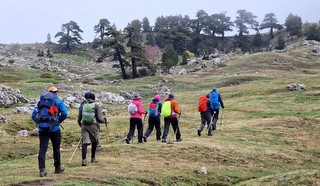We’re all more aware than ever of our carbon footprint, and much has been written about the contribution that clothing manufacturers can make to the planet’s health. As we gear up for our 2024 season you might be thinking about sorting your hiking kit, so here are some top tips to look out for.
Choose your fabrics carefully
Cotton is always breathable and comfortable for hiking, but organic cotton is better for the environment as it uses less synthetic pesticides and fertilizers. Alternative fabrics such as hemp or bamboo are fast-growing, lower impact crops which require less water and pesticides, and can be made into durable, breathable garments. Many outdoor companies are now using recycled nylon or recycled polyester, made from discarded plastic bottles or old fishing nets for example, and these products are hard-wearing and quick-drying. Wool of course is a natural and renewable fibre that is biodegradable, but always check the labels for ethically-sourced wool.


Think about the people making your clothes
Choose clothing from manufacturers who make a point of ensuring fair wages, safe working conditions and reasonable working hours for employees. Do they support local community or charitable projects where the manufacturing takes place? As a rule, the cheaper the item the less likely it is that these points have been taken into consideration. You can also keep an eye out for cruelty-free practices for wool or leather products. Recognised organisations such as Fair Trade, Global Organic Textile Standard (GOTS), or bluesign® are labels to look out for, as you will be supporting companies that adhere to ethical and sustainable standards. The real gold standard is a company with B-Corp certification – proof that a business is meeting high standards of verified performance, accountability and transparency. Berghaus, Patagonia, Kathmandu, Alpkit and Finisterre are all brands with B-Corp certification and all are open about their sustainability aims on their websites.


Consider the production process
Some companies provide total transparency about their supply chain, from raw material sourcing to manufacturing and distribution, so if you can support these brands you will be making a difference. Energy-efficient practices in the manufacturing process will minimize their impact on the environment. Review global shipping methods if goods are coming from overseas and check whether companies encourage customers to repair or recycle clothing. See if they publicise zero waste goals, or carbon offset by planting trees for example, or support Sharewear schemes which save clothing from landfill and redirect it to those in need.
We can all try harder to be conscious consumers, taking time to investigate the products we are purchasing, and keeping items for as long as possible. Choosing your hiking gear should be just the same. See more of our recommendations for what to pack on our tours on our Kit List page.
